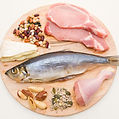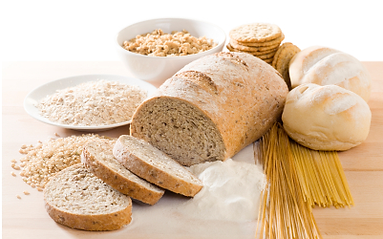Nutrition ABC's
Nutrition
Nutrition is the process of taking in food and using it for energy, growth, and repair. It is about eating a healthy and balanced diet. Food and drink can give you the energy and nutrients you need to be healthy.
6 classes of nutrients
Water
Proteins
Fats
Carbohydrates
Vitamins
Minerals










Vitamins
There are 13 essential vitamins: Vitamins A, C, D, E, K and the B vitamins: thiamine (B1), riboflavin (B2), niacin (B3), pantothenic acid (B5), pyroxidine (B6), biotin (B7), folate (B9) and cobalamin (B12). Vitamin A is in peaches and carrots and helps with eyesight. B vitamins are important for metabolism because they help the body release energy from carbohdrates, protein, and fat. You can get B vitamins from beans, fish, turkey, meat, eggs, and milk. Vitamin C is in oranges and kiwi and helps your body fight germs and heal from cuts. You can get Vitamin D from the sun and it is found in fish, eggs, and fortified milk. Vitamin D helps to absorb calcium and it is important for strong bones and teeth and a healthy immune system. Vitamin E helps make red blood cells and is an antioxidant. Spinach, almonds, avocados, and fish have vitamin E. Vitamin K is in leafy green vegetables and helps in blood clotting and building strong bones.
Minerals
The essential minerals are calcium, zinc, iron, copper, potassium, sodium, phosphorus, magnesium, chloride, sulfur, iodine, selenium, manganese, molybdenum, fluoride, and chromium. Dairy foods have calcium to help make your bones strong. Zinc, iron, and copper are important for a healthy immune system. Beans, grains, and nuts have zinc to help cells divide properly. Spinach and meat have iron to help your blood carry oxygen through the body. Leafy greens and squash have copper to help with wound healing. Bananas, potatoes, and spinach have potassium to help keep blood pressure low. Sodium and potassium help keep cells properly charged which helps your nerves and muscles to function correctly. Phosphorus is found in fish and nuts and works with other minerals to help your body produce and store energy. Nuts, fish, and leafy greens have magnesium to help your body make protein. Magnesium and calcium work together to help with muscle contraction. Chloride is found in salt and helps with fluid balance. Sulfur is important in making proteins and it is found in eggs, meat, fish, and cabbage. Iodine is found in seafood and milk and helps regulate growth and development. Meat, seafood, and grains have selenium which is an antioxidant. Grains have manganese and molybdenum which are parts of some enzymes. Fluoride is important for teeth and is usually in drinking water. Grains, nuts, and cheese have chromium which helps regulate blood sugar levels. Other minerals that are needed in tiny amounts are nickel, silicon, vanadium, and cobalt.
An additive is a substance put in food to increase its nutrition, keep it from spoiling, or to give it a better flavor, texture, or look like color.
A Additive
B Balanced Diet
A balanced diet means getting the right types and amounts of food and drink from each of the 5 food groups that your body needs to be healthy.
Carbohydrates are sugars and starches that your body uses for energy.
C Carbohydrate
D Digestion
Digestion is the process of breaking down food into substances that your body can absorb and use.
Energy is the ability to do work. Your body uses food for energy.
G Grain
Fiber is a plant material in fruit, vegetables, legumes, and grains that cannot be digested but helps you to digest other food.
F Fiber
E Energy
Bread, pasta, oatmeal, cereal, rice, tortillas, grits, and couscous are examples of grain products.
Healthy means to be strong and well. Good nutrition and daily exercise help you to be healthy.
H Healthy
I Iron

Iron is a mineral that carries oxygen in the blood to cells in your body to give you energy. Iron is found in meat, fish, poultry, spinach, and beans.
J Juice
Juice is the liquid from fruit or vegetables. Some popular juices are orange juice, apple juice, grapefruit juice, cranberry juice, grape juice, pineapple juice, and tomato juice.
A kitchen is an important place for getting proper nutrition. Stock your kitchen with nutritious food and cook healthy meals.
K Kitchen
L Legume

A legume is a plant that has its seeds in a pod, such as a bean or pea.

M Minerals
Minerals are a group of essential nutrients needed to regulate body processes and fluid balance, and give structure to bones and teeth.

N Nutrient
A nutrient is a substance you need to produce energy, grow, and function.

O Oil
Vegetable oils like olive oil, corn oil, and sunflower oil have nutrients like fats and vitamins. Oils can be used for cooking and flavoring food.

P Protein
Dairy food, meat, nuts, eggs, and beans have protein to help you grow and are needed for the structure, function, and regulation of the body's cells, tissues, and organs.

Q Quality
A high quality diet is high in fruit, vegetables, whole grain, and protein.

R Riboflavin
Riboflavin is part of the vitamin B group. Cheese, almonds, and spinach have riboflavin.

S Saturated Fat
Saturated fat is found in coconut oil, red meat, poultry, cheese, and butter.

T Thiamine
Thiamine is vitamin B1. Thiamin is found in oranges, nuts, eggs, beef, oats, pork, seeds, legumes, and peas.

U Unsaturated Fat
Unsaturated fat is found in nuts, seeds, and vegetable oils like olive oil, peanut oil, sunflower oil, canola oil, and corn oil.

V Vitamin
A vitamin is a group of substances needed for normal growth and nutrition. Vitamins are required in small quantities in the diet.

W Water
Xanthophyll is a yellow pigment and nutrient in some plants that helps eyes. It can be found in spinach, corn, peppers, apricots, peaches, pink grapefruit, and oranges.

X Xanthophyll
All parts of the body contain some water. The lungs, blood, skin, muscles, and brain contain lots of water.

Y Yogurt
Yogurt is a dairy food produced by bacterial fermentation of milk. It is a good source of calcium and protein.

Z Zinc
Zinc is a mineral found in meat, eggs, and legumes.
Water
Water is in our bodies and the air we breathe. Most people can survive only a few days without water. Water controls body temperature, moves nutrients around the body, removes waste from the body, keeps skin smooth, keeps some areas like the mouth moist, and protects some areas like the brain and eyes. It is important to drink water so you can put back the water that you lose when you breathe, sweat, and go to the bathroom.
Proteins
Proteins are the building blocks of life and every cell in your body contains protein. Proteins do most of the work in cells. You need protein to help your body repair cells and make new ones. Protein is also important for growth and development.
Fats
Your body makes its own fat from taking in extra calories. Some fat called dietary fat is found in food from animals and plants. Fat helps give your body energy, build cells, transport oxygen, and clot blood. Fat-soluble vitamins like Vitamin A need fat to be absorbed and used by your body. Fats can be saturated or unsaturated. They have differences in their chemical structures. Saturated fats are usually solid and unsaturated fats are usually liquid at room temperature. Unsaturated fats are considered more healthy than saturated fats.
Carbohydrates
Your body needs carbohydrates for energy. Sugars like fructose, glucose, and lactose are simple carbohydrates. Starches are complex carbohydrates found in food like starchy vegetables, grain, rice, pasta, bread, and cereal.






